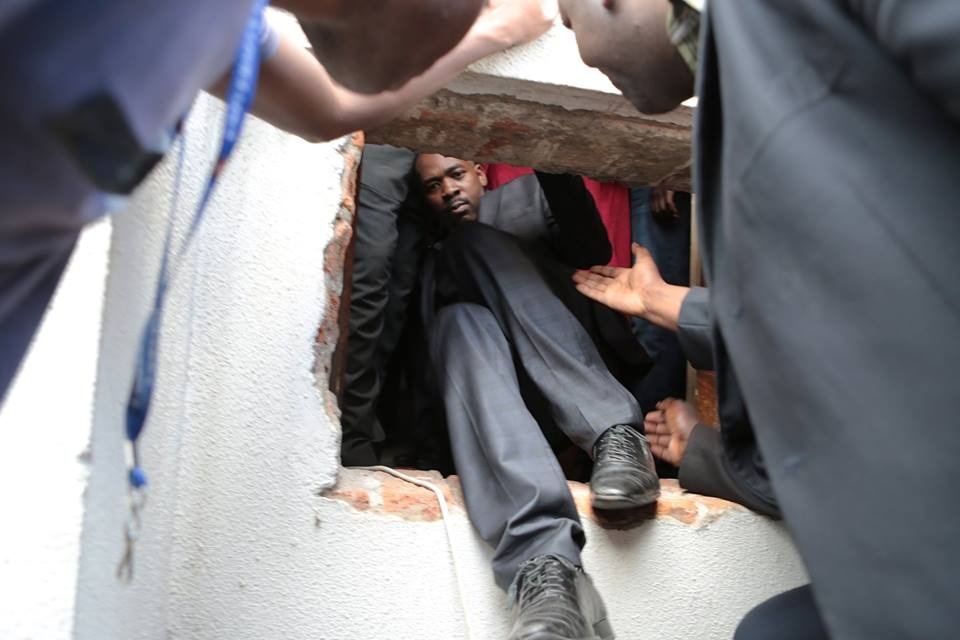By Ashley Kondo
The MDC leader, Nelson Chamisa, finds himself in a political dilemma of his lifetime ahead of the party’s elective Congress which appears to be threatening his political career and the lifespan of his embattled party.
The party’s elective Congress which is scheduled for May 2019 will be the first one without his predecessor, the late Morgan Tsvangirai.
It comes at the back of a contested take-over of the MDC by Chamisa, hence a legitimacy test for the opposition leader.
Chamisa’s ascension to the throne was heavily criticised as unprocedural and out of sync with the provisions in the party constitution.
This resulted in one of Tsvangirai’s longest serving deputies, Dr Thokozani Khupe, to form a break-away faction (MDC-T Khupe), on the eve of the 2018 polls thus further shattering the party’s aspirations of winning the Presidential seat.
Although the MDC has championed itself as a democratic party, Chamisa’s alleged self-imposition as leader is clear evidence that the opposite is true of the party.
After suffering defeat in 2018 Presidential elections, Chamisa has been making relentless efforts to remain relevant on the political arena in order to maintain a firm hold on power.
The first step was to in-cooperate members of the political parties in the MDC Alliance into MDC, before restructuring of the party leadership.
Under the new leadership structure of the party, Chamisa made sure he remained President of the party, deputised by Engineer Elias Mudzuri, Morgan Komichi and Professor Welshman Ncube. Tabitha Khumalo became the party’s National Chairperson, deputised by Tendai Biti while Douglas Mwonzora remained the Secretary General.
Secondly, Chamisa resorted to manipulating gullible party supporters to engage in violent demonstrations which left many dead both in August 2018 and January 2019 with the sole aim of posturing as a frelevant force to reckon with among other opposition faces.
The latest strategy has been a cosmetic diplomatic offensive aimed at gaining both local and international recognition as well as some imagined bargaining power among his cronies.
The recent defeat of the MDC by ZANU PF in the Cowdry Park Ward 28 Council by-elections which were held on 30 March 2019 unearthed fresh complications for Chamisa.
The MDC fielded double candidates to contest the election and many have questioned the logic for doing so arguing that this cost the party.
However, recent remarks by Chamisa over the electoral defeat point to rising tension in the opposition outfit along factional lines.
Chamisa took to social media saying, “The Cowdry Park Ward election results a stark reminder of the urgent need for far reaching ‘root & branch’ reforms & renewal set to kick in at congress. Leadership excesses and conduct that resulted in the party donating a seat to our opposition is regrettable. This is the last of it!”
He added, “We have had a serous ‘invisible hand’ we have since discovered and about to cut it off”.
A number of readings have been drawn from these hard and harsh words from the opposition leader.
The statements by Chamisa indicate power struggles within the MDC top brass ahead of the elective Congress.
This comes amid a heated debate among the party members over whether or not the party presidency position should be contested at the forthcoming Congress.
Mudzuri and Mwonzora have argued that all positions must be contested in line with the party’s constitution. However, pro-Chamisa supporters have accused them of plotting against their boss labelling them enemies of Chamisa.
Sources close to developments in the MDC have revealed that Mwonzora has become a threat to Chamisa’s political ambitions and he is employing all dirty tactics necessary to clinch the presidency.
Whilst Chamisa could use his powers to purge some senior members of his party, but this would be viewed as laying ground for his success ahead of the elective Congress.
This would cast him in bad light and give impetus to the narrative that he is afraid of electoral defeat to the Mwonzora.
On the other hand, the move would cost the party as another split would be inevitable given that the grassroots party structures have evidently become divided along factional lines.
It is highly likely that Chamisa would hammer on his rivals after Congress should he return the party presidency.
A less costly move would be to relegate his rivals to less powerful and less influential positions.
However it remains to be seen whether Chamisa will be able to keep his sinking ship afloat.




